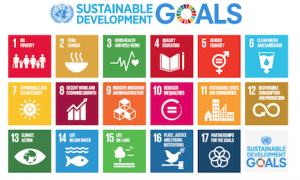Stakeholders undergo training to localize SDGs for successful implementation

A training of trainers workshop is underway in Accra to build the capacity of local government experts to turn the Sustainable Development Goals (SDGs) into local realities for the indigenes to effectively participate in achieving the goals.
The three-day workshop, dubbed; “Localizing the Agenda 2030,” is being held at the Ghana Institute of Management and Public and Administration (GIMPA), they are organizing the programme in collaboration with the National Association of Local Government Authorities of Ghana (NALAG).
Other organisations that helped in organizing the workshop are the African Local Government Academy (ALGA), United Cities and Local Governments (UCLG) Africa, the Islamic Educational, Scientific and Cultural Organisation (ISESCO) and Municipal Institute of Learning (MILE) of the Ethekwini Municipality in Durban, South Africa.
It is to train a third cohort of trainers from Ghana and the West Africa Region on localizing the SDGs and territorial planning, who would in turn train others on the dissemination of the SDGs in the rest of Africa.
The 52 participants are from Ghana, Uganda, Nigeria, Togo, Cameroon, Benin and Sierra Leone.
It would be recalled that on January 1, 2016, the 17 SDGs of the 2030 Agenda for Sustainable Development, adopted by world leaders in September 2015 at an historic United Nations Summit, officially came into force.
The 17 SDGs and its 169 targets serve as a road map of action for people, the planet, prosperity, peace and partnership.
Local and regional governments played a key role in this regard, in particular concerning SDG 11 on; “Making Cities and Human Settlements Inclusive, Safe, Resilient and Sustainable”.
Mr Felix Mensah Nii Anang-La, the Tema Metropolitan Chief Executive, said the 2030 Agenda represented the latest stage in the process towards achieving sustainable development.
He said the plan, which was grounded in the Report of the World Commission for Sustainable Development (WCSD) dubbed; “Our Common Future,” stated that environmental protection, social development, and economic growth should occur simultaneously.
Mr Anang-La noted that it identified global environmental problems as an important cause of poverty and North-South inequality, and proposed different measures to be implemented by developed and developing countries.
“The adoption of the SDGs signaled a move from the implementation model of the WCSD – passed onto the Millennium Development Goals (MDGs)- that differentiated implementation responsibilities for developed and developing countries,” he said.
He said with the SDGs, the targets and indicators were universal, with room for localisation; adding that agenda 2030 was underpinned by the three pillars of sustainable development: economic, social and environment.
He said Ghana had added a fourth dimension; strengthening institutions; stating that those were crucial to achieving all the goals.
Mr Anang-La said this was because ultimately the SDGs were for the people, and would only be achieved with the people, public institutions and businesses working together.
“It is for this reason that all hands must be on deck in the implementation of this global goals for the benefit and welfare of our people,” he said.
“But to achieve this feat, we must break down the goals for our locals to identify with the global goals, this is what we are all calling localizing the Agenda 2030.”
He said localizing the SDGs means making the aspirations of the SDGs become real to communities, households and individuals, particularly to those who were at risk of falling behind.
He said local governments were critical in turning Agenda 2030 from a global vision into a local reality since they were directly dealing with them at the grassroots.
“For instance, I stated to the house (Tema Metropolitan Assembly) that, even though Tema, for instance, serves as the industrial city of Ghana where there are agglomeration of industries, the city is equally experiencing some characteristics of slums cities and poverty pockets; which must be quickly addressed if we need to bridge equality and prevent such people from falling into the state of vulnerability,” he said.
He noted that over the years, through support from state agencies such as the National Development Planning Commission (NDPC), the district assemblies were assisted in mainstreaming SDGs into their District Development Plans; so as to ensure adequate budgetary support to metropolitan, municipal and district assemblies (MMDAs) development projects and programmes, which were implemented to achieve the SDGs.
Prof Philip Duku Osei, Deputy Rector of GIMPA, said the three-day training of trainers programme would enable participants to acquire the knowledge, skills and tools for localising the SDGs.
“Basically, the essence of this workshop is not only to learn some new skills about how to extend the goals to the different local authorities. My emphasis will be on how to make the sensitisation go down to the different community levels.”
“And we have the experience from the implementation of the MDGs implementation where communities were made to understand their roles and responsibilities. And it is the same with the SDGs as well.”
He said when the SDGs were broken down into its various components, it would be found that it was the individuals and families who could help achieve the objectives; such as environmental cleanliness, issues to deal with water and sanitation, and ending hunger.
He said Ghana had basically mainstreamed the SDGs as well as the African Union Agenda 2063 in its Integrated Development programme.
Madam Genevieve Hartley, the Municipal Technical Support Programme Manager, MILE, South Africa, facilitator of the workshop, told the Ghana News Agency that governments needed the political will to successfully implement the SDGs.
Source: GNA
